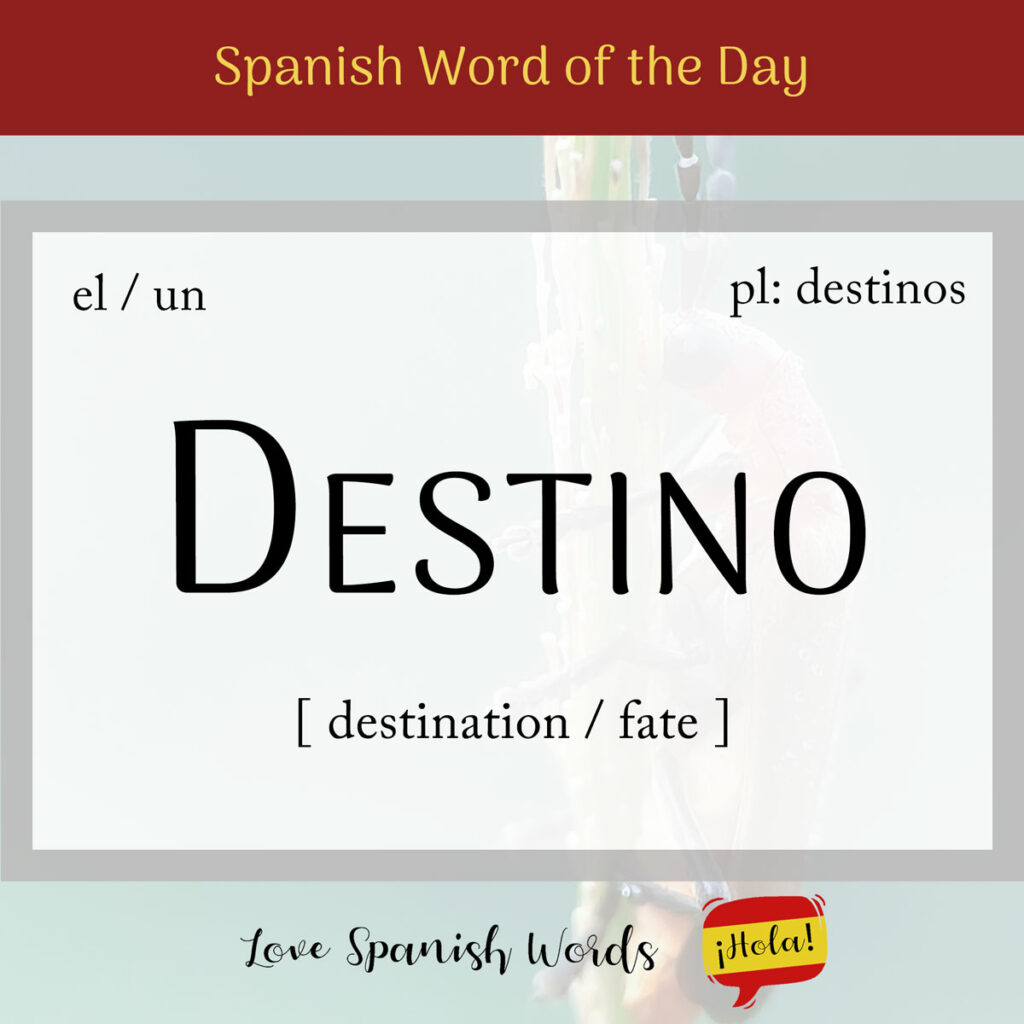Have you ever experienced something that made you feel like a greater force was guiding the outcome, beyond your own control? If so, you’ll love today’s word – destino.
Latin American Pronunciation
European Pronunciation

Destino comes from the Latin dēstinō and is found in all Latin languages.
In its simplest form, destino translates to destination, referring to the place someone is going or something is sent. However, it also means fate in English, carrying a deeper, philosophical connotation. It encompasses the idea of destiny, suggesting that certain events are preordained and some outcomes are inevitable.
Since it is a masculine noun, it takes the following definite and indefinite articles:
- el destino = the destination / fate
- los destinos = the destinations / fates
- un destino = a destination / fate
- unos destinos = some destinations / fates
‘Destino’ as a Destination
When used to describe a place or endpoint, destino is often paired with verbs like llegar (to arrive) or dirigirse (to head toward).
Hemos llegado a nuestro destino.
We have arrived at our destination.
Nos dirigimos hacia nuestro destino de vacaciones.
We are heading towards our vacation destination.
‘Destino’ as Fate or Destiny
Destino also plays a role in expressing the concept of fate or destiny, often associated with life’s journey or the inevitable outcomes of events.
Creo que encontrarnos era nuestro destino.
I believe that finding each other was our destiny.
No se puede luchar contra el destino.
You can’t fight against destiny.
Cultural Significance
Many people in Spanish-speaking cultures, influenced by Catholicism and spiritual traditions, believe that certain events in life are preordained or guided by a higher power, whether it’s God, the universe, or fate itself.
Those who believe that destino is in the hands of Dios (God) trust in a divine plan for their lives. This belief is reflected in sayings like Dios lo quiso (God willed it), which implies that certain events are beyond human control.
There are also those who hold onto folk beliefs, relying on agüeros (omens), signs, and fortune-telling practices like reading tarot cards or interpreting coffee grounds to see what the future holds.
And even those who don’t believe in a specific higher power may hold to the idea that certain people are meant to be together, or that certain relationships are escrito en las estrellas (written in the stars).
How about you? ¿Crees en el destino? (Do you believe in destiny?)

Spanish idioms featuring ‘destino’
Spanish offers several ways to use destino in everyday conversation. Here are a few common phrases.
El destino quiso que…
Literal translation: Fate wanted that…
English meaning: this expression is used to introduce an event that seems to have been preordained or destined to happen. For example: El destino quiso que nos encontráramos aquí. = Fate wanted us to meet here.
Jugar con el destino
Literal translation: To play with fate
English meaning: This phrase is often used to describe actions that seem to tempt fate or challenge what is seen as the natural course of events.
Destino cruel
Literal translation: Cruel fate
English meaning: This is used to describe a tragic or unfortunate event that seems to be the result of destiny’s harsh hand. For example: Fue un destino cruel que la llevó tan pronto = It was a cruel fate that took her so soon.

